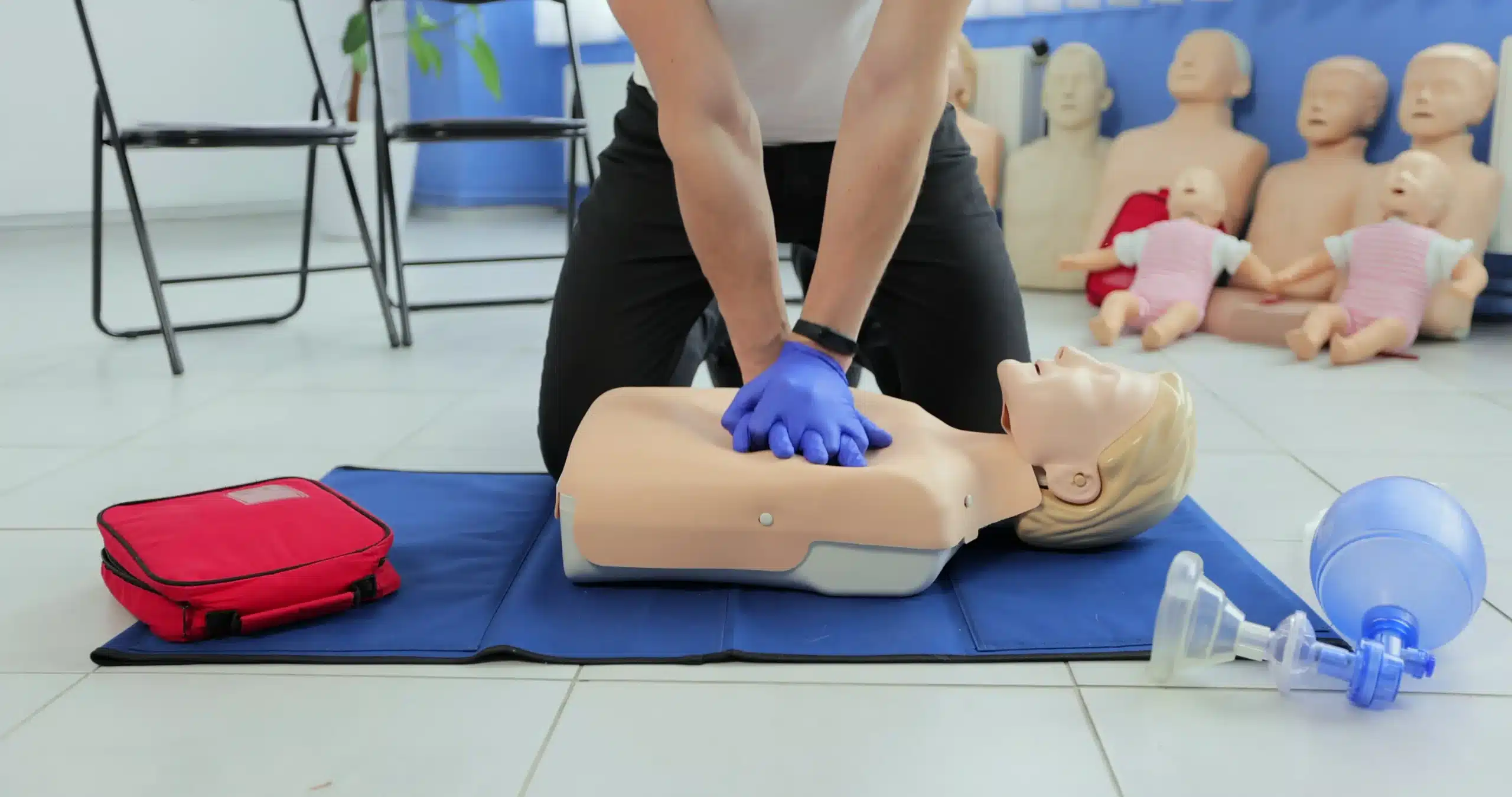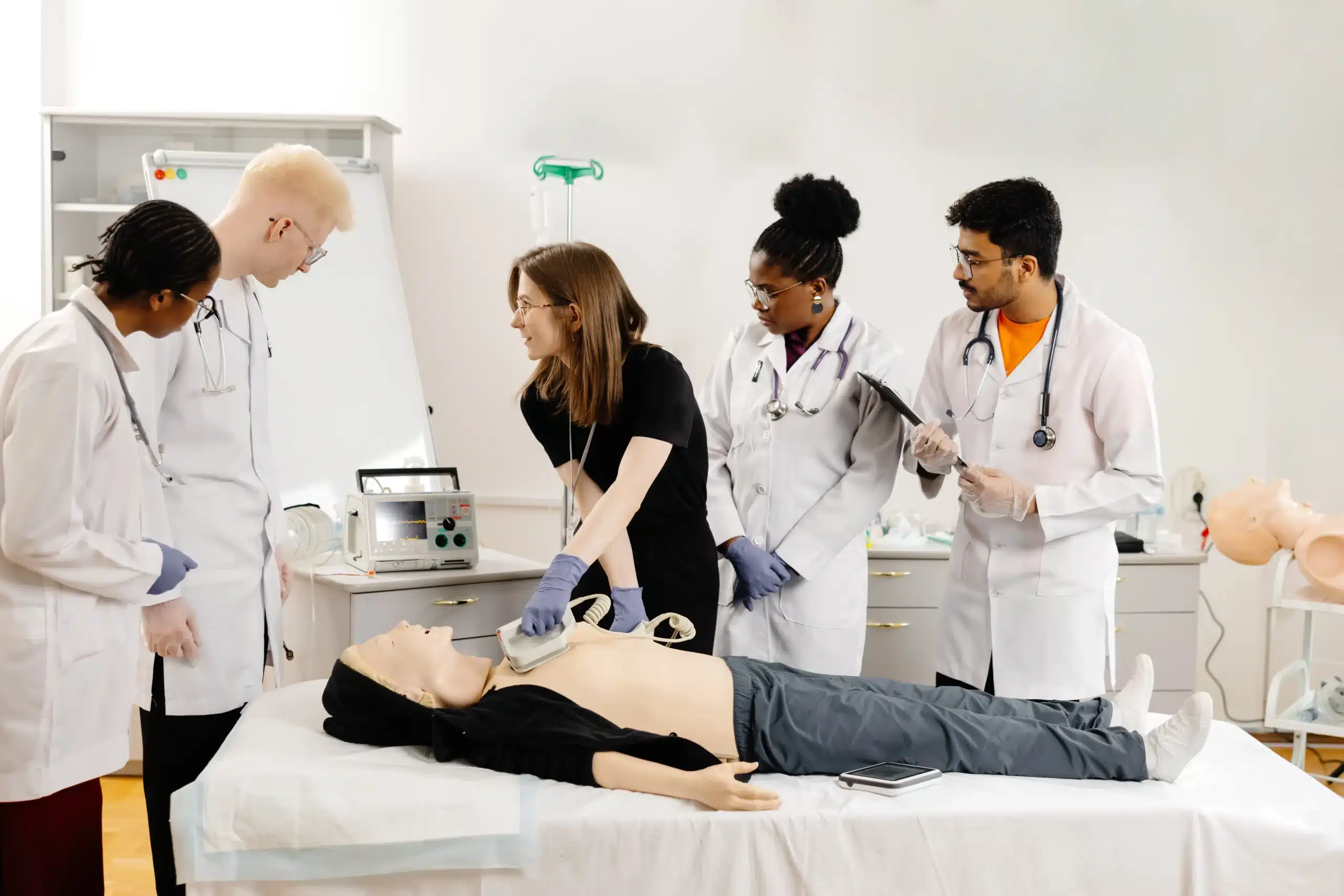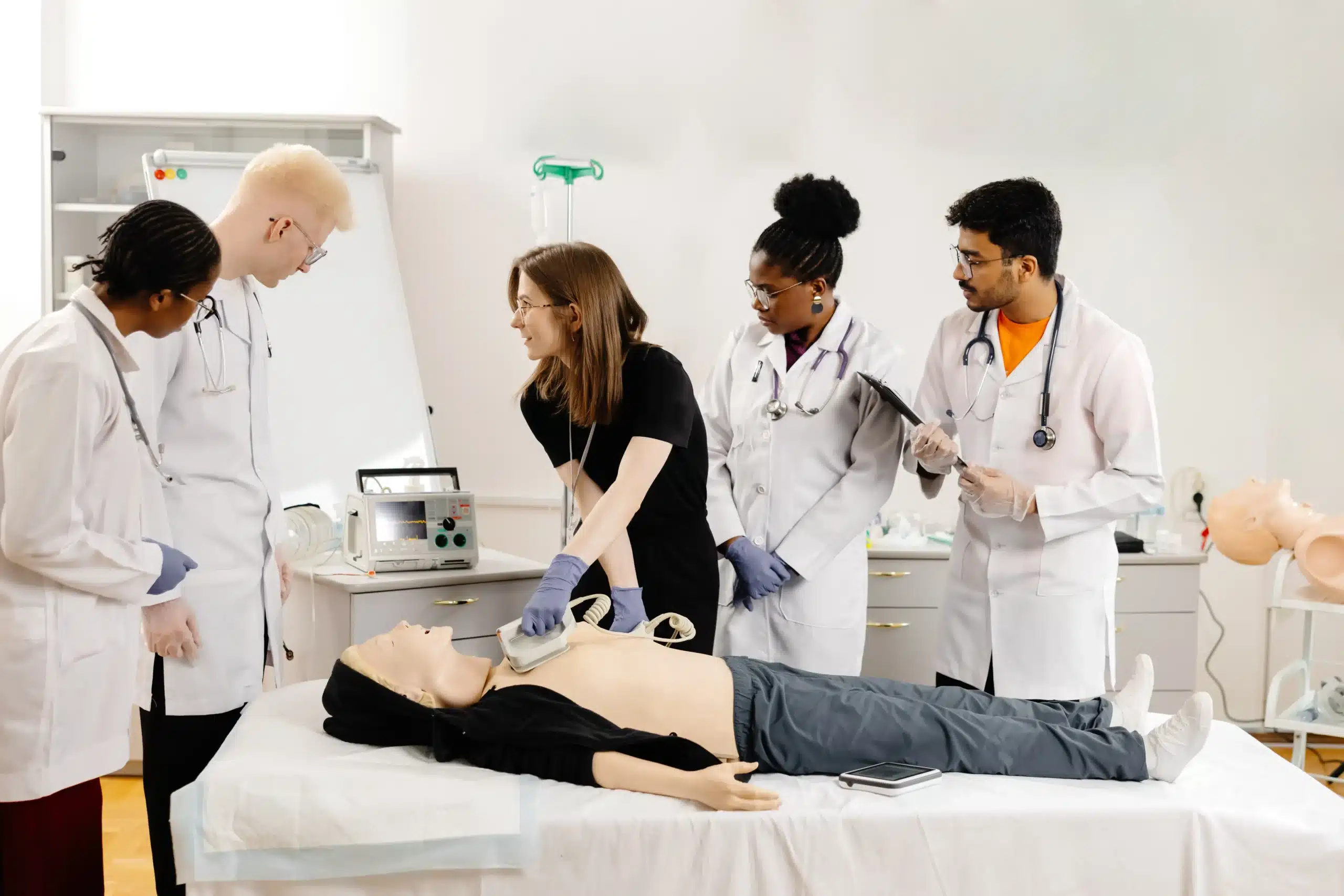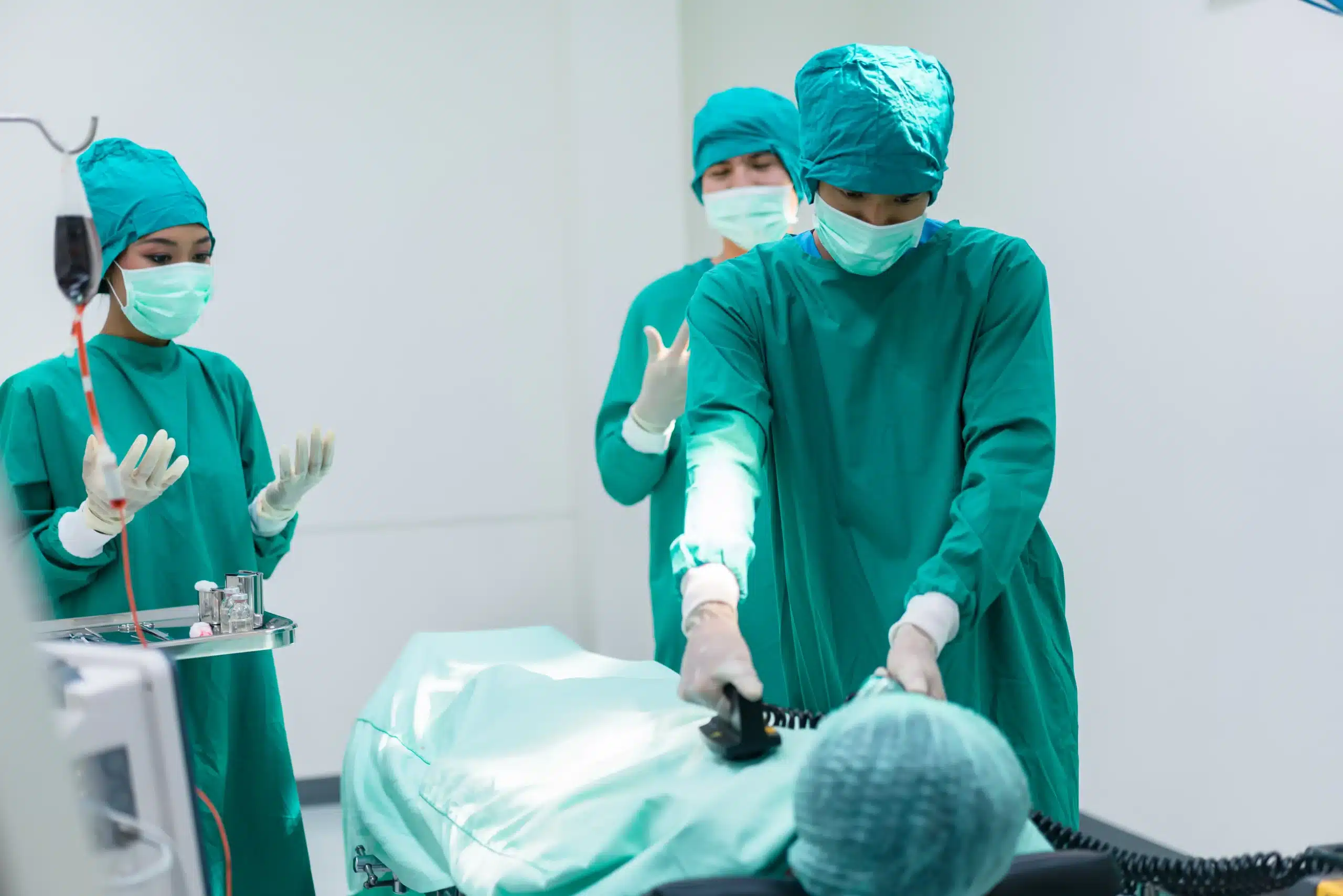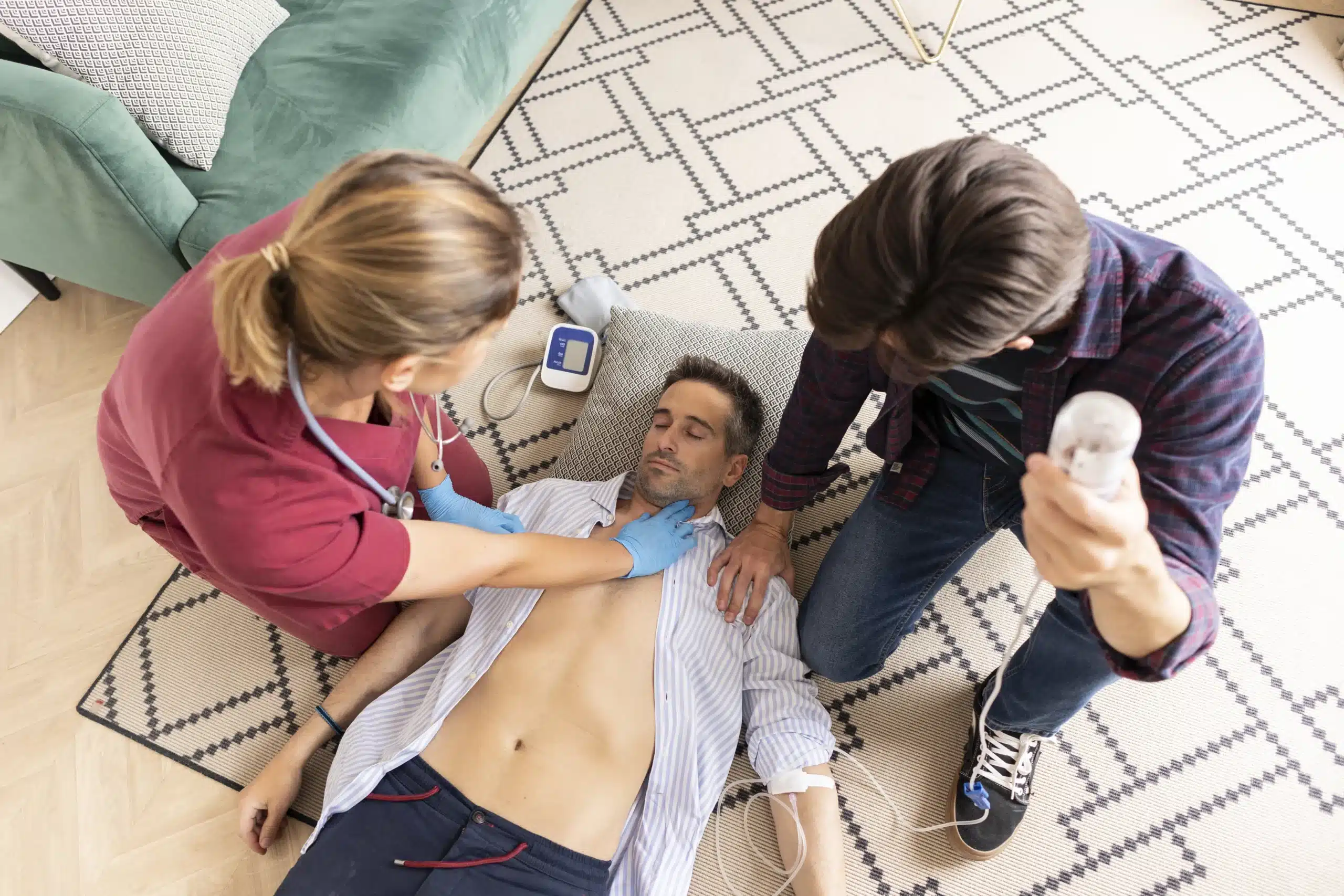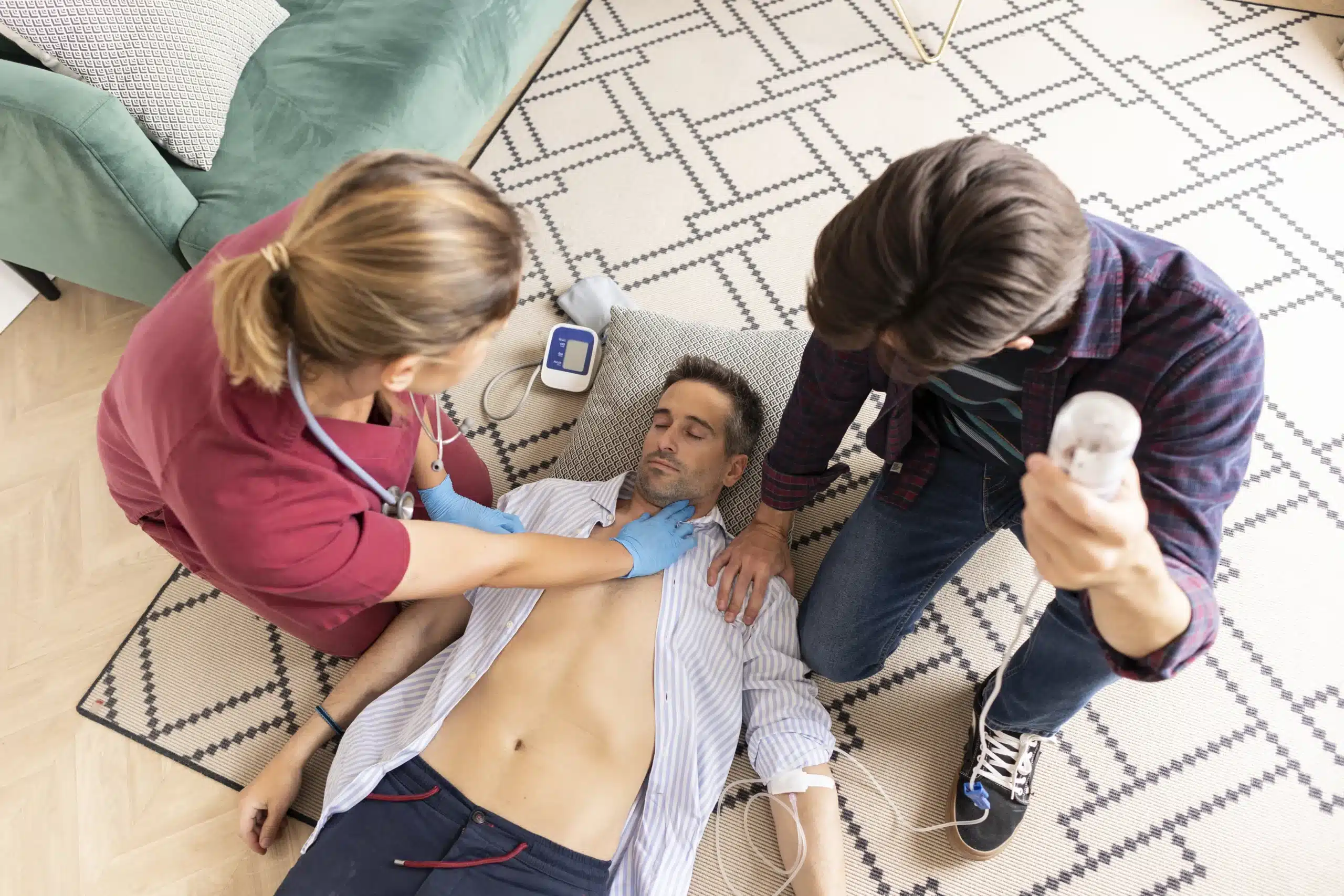Emergencies can happen anytime, anywhere. Would you know what to do if someone suddenly collapsed or stopped breathing? Learning CPR and first-aid in Fairfield can empower you to respond confidently and potentially save a life. This comprehensive guide breaks down everything you need to know about CPR and first aid training, from understanding the basics to finding the right course in Fairfield, CA, and maintaining your skills. We’ll explore the importance of these life-saving techniques, debunk common training myths, and provide resources to help you get started on your journey to becoming a more prepared and confident individual.
Key Takeaways
- CPR and first aid skills empower you to act in emergencies: From minor injuries to life-threatening situations, these skills equip you to provide immediate care until professional help arrives. Find a course that aligns with your specific needs and responsibilities.
- Research different providers and course formats: Consider the curriculum, teaching style, and certification offered. Whether you prefer online flexibility or in-person interaction, choose a program that suits your learning style and schedule. Don’t forget to compare costs and look for potential discounts.
- Stay current with your training: Regularly refresh your skills and knowledge to maintain your certification and ensure you’re always prepared to respond confidently. Look for renewal courses and consider advanced training options to expand your skillset.
What are CPR and First Aid?
Defining CPR and First Aid
CPR (cardiopulmonary resuscitation) and first aid are both emergency, life-saving techniques, but they address different situations. CPR is performed when someone is unconscious and either not breathing or only gasping (cardiac arrest). It involves chest compressions and rescue breaths to circulate oxygenated blood. First aid, on the other hand, encompasses a broader range of responses to various injuries and medical emergencies, from minor cuts and burns to more serious situations like choking or a sudden allergic reaction. Knowing the difference between these two techniques is crucial for responding effectively in a crisis. For a helpful comparison, check out this article on CPR and first aid.
Why CPR and First Aid Skills Matter
Learning CPR and first aid empowers you to make a real difference in critical situations. These skills can help you stabilize someone until professional medical help arrives. The Red Cross emphasizes the importance of CPR training and offers information on its life-saving impact. Quick action is especially critical during cardiac arrest, as every minute without CPR decreases the chances of survival. Equipping yourself with these skills can give you the confidence to act quickly and potentially save a life.
Debunking CPR and First Aid Training Myths
One common misconception is that only certain certifications are accepted. While the American Heart Association (AHA) certification is often preferred in healthcare settings, many employers accept certifications from other reputable organizations like the Red Cross, especially for roles requiring general CPR readiness. Choosing the right certification depends on your specific needs and career goals. If you’re unsure which certification is best for you, reach out to potential employers or licensing boards for clarification. CPR Classes Near Me offers a good overview of AHA vs. Red Cross training.
Find CPR and First Aid Training in Fairfield
Finding the right CPR and first aid training can feel overwhelming with so many options. This guide breaks down providers and programs in and around Fairfield, California, so you can choose the best fit.
American Heart Association Courses
The American Heart Association (AHA) sets the standard for CPR and first aid training. They offer various courses, from basic CPR and first aid for the community to advanced certifications like Basic Life Support (BLS) for healthcare providers. AHA courses cover essential life-saving techniques and are widely recognized.
Red Cross Programs
The American Red Cross also provides CPR and first aid training. While their main location listed is in Fairfield, NJ, they often have programs throughout the region. Check the Red Cross website for classes near Fairfield, CA. Their courses are developed with input from their Scientific Advisory Council, ensuring you learn current techniques.
Fairfield CPR Classes Offerings
For convenient, local training, consider Fairfield CPR Classes. They offer a variety of AHA-certified courses, including BLS, ACLS, PALS, and more. Their focus on hands-on training and flexible scheduling makes them a practical choice. They serve Fairfield, Vacaville, and Suisun City, CA.
Other Local Providers
Several other providers offer CPR and first aid training in the greater Fairfield area. These can be great options for those seeking more personalized instruction or specific courses.
Your Home CPR
Your Home CPR offers training in and around Fairfield, CT. While not in California, they may be a helpful resource for those in Connecticut seeking courses in CPR, AED, and first aid. Visit the Your Home CPR website for more information.
LifeSavers, Inc.
LifeSavers, Inc. is a long-time provider of CPR and first aid training with experience serving diverse groups. They offer a comprehensive selection of courses and related products.
Compare Course Curricula and Teaching Methods
When choosing a course, consider the curriculum and teaching style. While both AHA and Red Cross certifications are widely accepted, their course content and exam requirements may differ. Researching these differences, such as through this comparison of AHA vs. Red Cross programs, can help you select the best program for your needs.
Explore Costs and Certification Details
CPR and first aid training are valuable investments, so understanding the costs and certification details is essential. Let’s break down what you can expect.
Course Price Ranges
CPR training costs vary based on the provider, the type of course (CPR, first aid, or a combination), and the level of certification. Basic CPR classes can start around $70, while more advanced courses like ACLS or PALS for healthcare providers are typically more expensive. Fairfield CPR Classes offers a low price guarantee, so you can feel confident you’re getting a competitive rate. Comparing pricing from different providers, including the American Red Cross and other local training centers like Your Home CPR is always recommended.
Additional Fees and Materials
Beyond the course fee, ask about any additional costs. Some providers might have extra charges for certification card processing, online materials, or practice equipment. Knowing the full price upfront helps you budget accordingly. Fairfield CPR Classes is transparent about pricing, so feel free to reach out with questions.
Certification Validity and Renewal
Most CPR certifications are valid for two years. This timeframe ensures your skills and knowledge are current. Keep track of your expiration date and plan to renew your training. Fairfield CPR Classes offers convenient renewal courses. Check with your employer or licensing board for specific renewal requirements.
Find Discounts and Promotions
Many training providers offer discounts, especially for groups. If you’re registering with others, ask about group discounts. Fairfield CPR Classes has special rates for group bookings. You might also find promotions or discounts for early registration, so it’s always worth checking.
Choose the Right CPR and First Aid Course
Choosing the right CPR and first aid course is a crucial step towards becoming a confident and prepared lifesaver. With various options available, consider these factors to find the perfect fit.
Factors to Consider
Both the American Heart Association (AHA) and the American Red Cross (ARC) are reputable providers of CPR and first aid training, and their certifications are widely recognized. Understanding the nuances of each can help you make an informed decision. For example, AHA courses often delve deeper into the science behind resuscitation techniques, while ARC courses may place more emphasis on disaster preparedness. Consider which aligns best with your learning style and goals.
Tailor Training to Your Needs
Think about your specific reasons for seeking training. Are you a healthcare professional requiring BLS certification, a parent wanting to learn infant CPR, or a teacher needing a refresher? Fairfield CPR Classes offers a range of courses tailored to various professions and community members, including specialized training like the RQI program for healthcare providers. Choosing a course specific to your needs will ensure you gain the most relevant skills and knowledge.
Online vs. In-Person Training
Consider your learning style and schedule when deciding between online and in-person training. Online courses offer flexibility, allowing you to learn at your own pace, while in-person classes provide valuable hands-on practice and direct interaction with instructors. Many courses, including those from Fairfield CPR Classes, provide AHA certification regardless of the format.
Prioritize Hands-On Practice
Regardless of the format, prioritize programs that emphasize hands-on practice. Mastering CPR requires physical skill and muscle memory, developed through repeated practice on mannequins. This practical experience will build your confidence and prepare you to respond effectively in a real-life emergency. Look for courses that offer ample opportunities for hands-on training and feedback from instructors.
Get Started with CPR and First Aid in Fairfield
So, you’re ready to learn CPR and first aid? Great! This section breaks down everything you need to know to get started in Fairfield. We’ll cover finding the right course, preparing for your training, and keeping your skills sharp.
Enroll in a Course
First things first: find a class that fits your schedule and learning style. A quick search will reveal several options for CPR and first aid certification in Fairfield. Consider established providers like the American Red Cross, or look into organizations like LifeSavers, Inc. with their extensive experience in CPR and first aid training. Remember to check if the course aligns with the latest guidelines from organizations like the American Heart Association. Fairfield CPR Classes offers a range of American Heart Association courses, including CPR and first aid, making it a convenient local option.
Prepare for Your Training
Once you’ve enrolled, take some time to prepare. Review any pre-course materials provided by your instructor. This might include basic anatomy or first aid principles. Familiarizing yourself with these concepts ahead of time will make your in-person training more effective. Also, jot down any specific questions you have about CPR or first aid so you can ask your instructor during the course.
Maintain Your Skills
CPR and first aid certifications expire. Understanding how long your certification remains valid and planning for renewal is essential. Look for refresher courses offered by your original training provider or other reputable organizations in Fairfield. Regular practice and renewal ensure you’re always ready to respond effectively in an emergency. Consider exploring RQI programs for maintaining your resuscitation skills.
Access Local Resources
Fairfield offers a variety of resources to support your training. Local CPR classes cater to various groups, from teachers and childcare providers to community members. Check with local community centers, hospitals, or training centers like Fairfield CPR Classes for information on courses and schedules. Fairfield CPR Classes offers courses daily in over 60 cities, making it easy to find a convenient time. They also have a low price guarantee and offer group discounts. For any questions, don’t hesitate to contact them directly.
Related Articles
- Why CPR is Crucial in Healthcare – CPR & First-Aid Training
- CPR Classes in Fairfield: Find the Right Course – Fairfield CPR Classes
- Debunking Common CPR Myths for Effective Response
- Workplace CPR & First-Aid Training Importance
- First-Aid Certification Courses in Vacaville, CA – Fairfield CPR Classes
Frequently Asked Questions
What’s the difference between CPR and first aid? CPR specifically addresses life-threatening breathing and cardiac emergencies, focusing on chest compressions and rescue breaths. First aid covers a wider range of injuries and illnesses, from minor cuts to more serious conditions like choking. Think of CPR as a specific tool within the larger first aid kit.
How do I choose the right CPR and first aid class? Consider your specific needs. Are you a healthcare provider, a parent, or someone wanting general knowledge? Think about your learning style (online vs. in-person) and look for classes that offer plenty of hands-on practice. Check if the certification aligns with your job or other requirements. Finally, compare costs and schedules to find the best fit.
Are all CPR certifications the same? While various organizations offer CPR certification, the American Heart Association (AHA) certification is often preferred, especially in healthcare settings. Other reputable organizations, like the Red Cross, also offer valuable training. Research different providers and their curricula to see which best suits your needs.
How much does CPR training cost, and what’s included? Costs vary depending on the provider, course type, and certification level. Basic CPR classes are generally more affordable than advanced certifications like BLS or PALS. Inquire about additional fees for materials or certification cards. Many providers offer discounts for groups, so ask about those options.
How can I keep my CPR skills up-to-date after completing a course? CPR certifications typically expire after two years. Stay current by taking refresher courses and practicing your skills regularly. Some providers offer renewal courses or programs like RQI to help maintain proficiency. Check with your employer or licensing board for specific renewal requirements.
